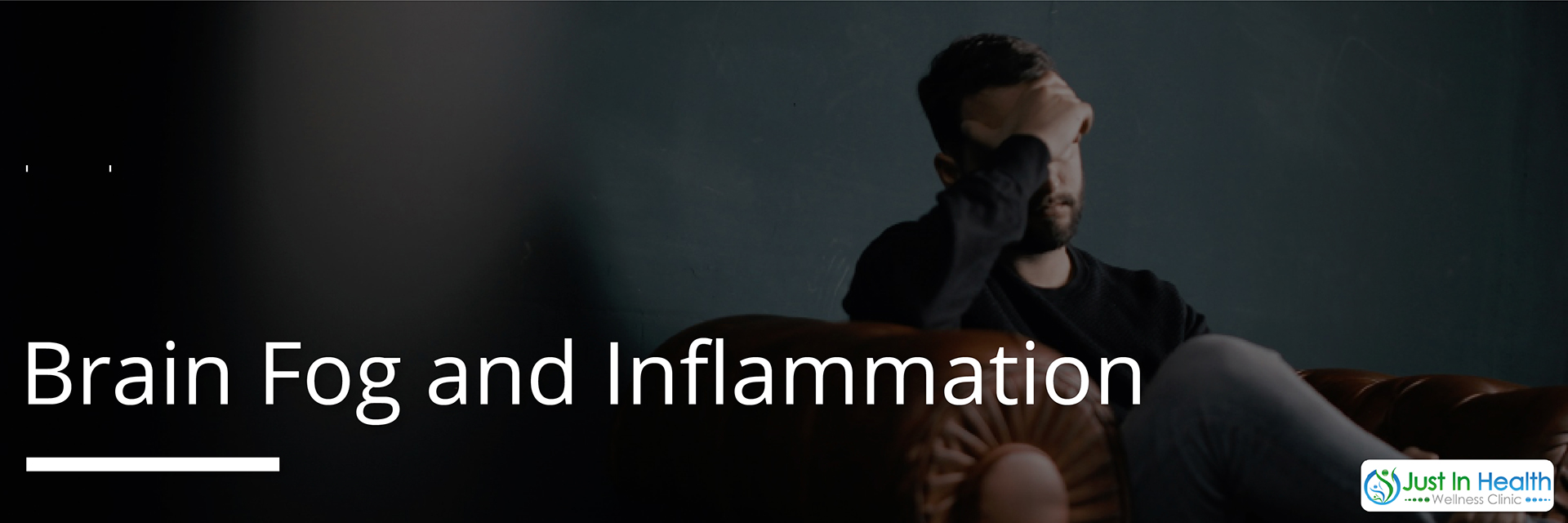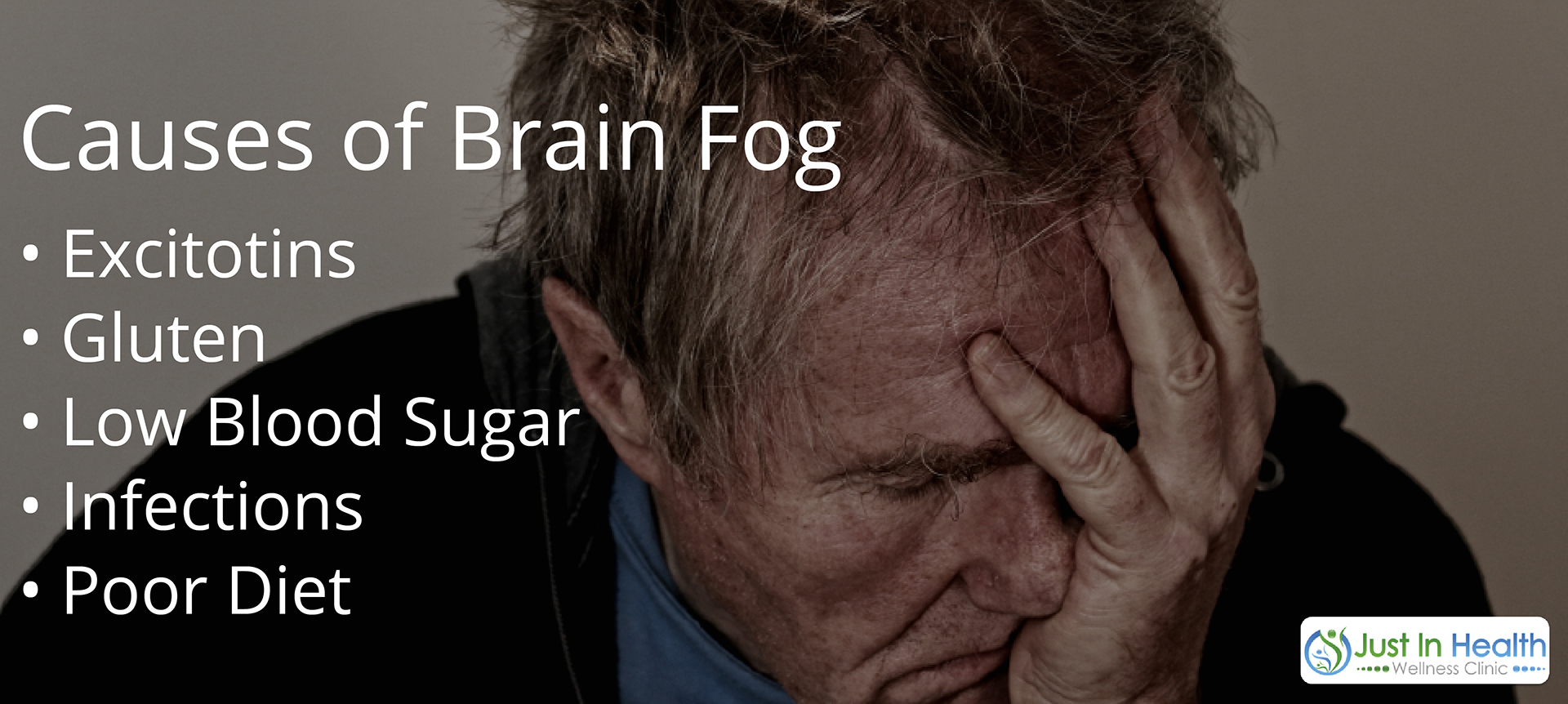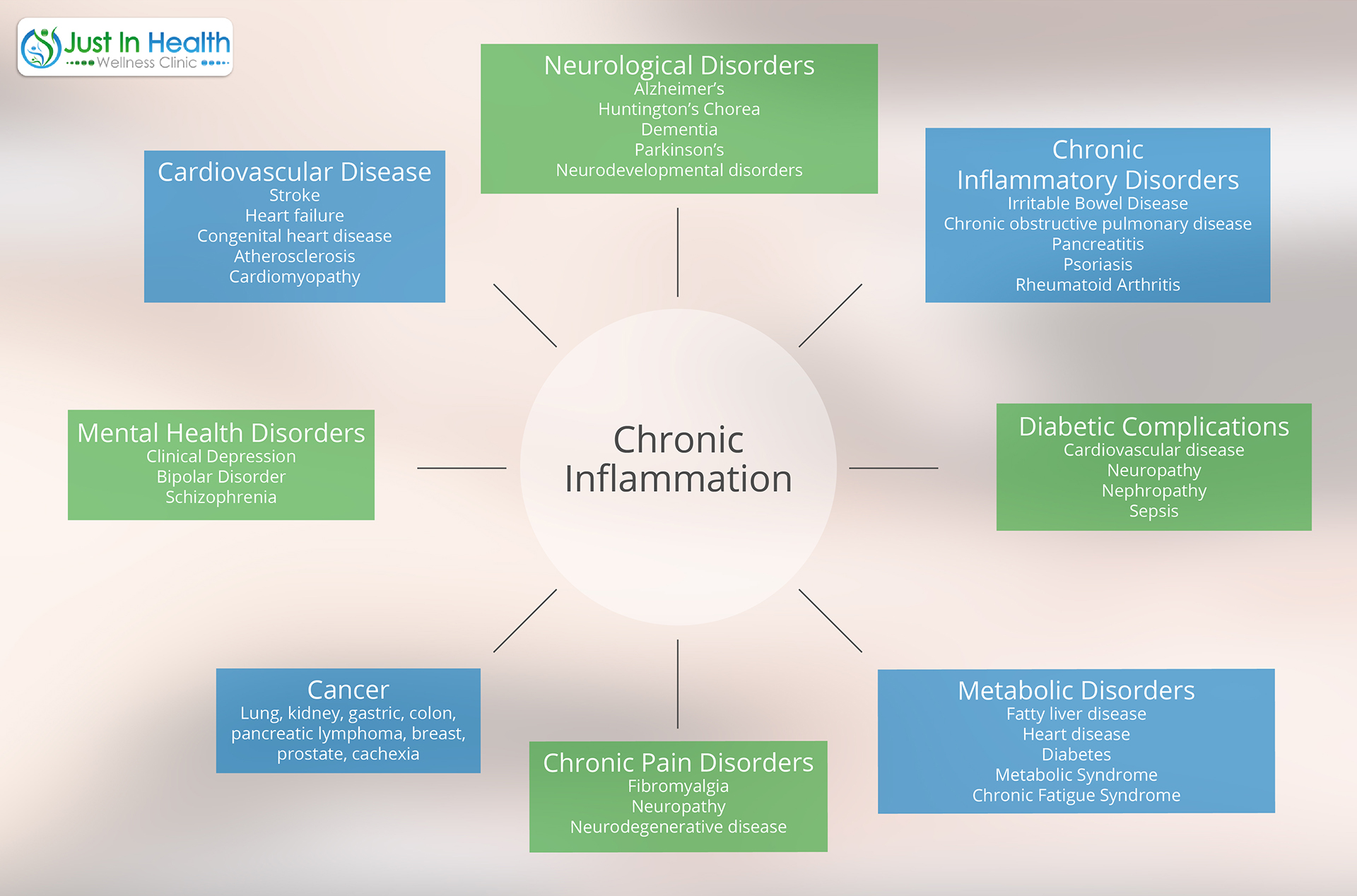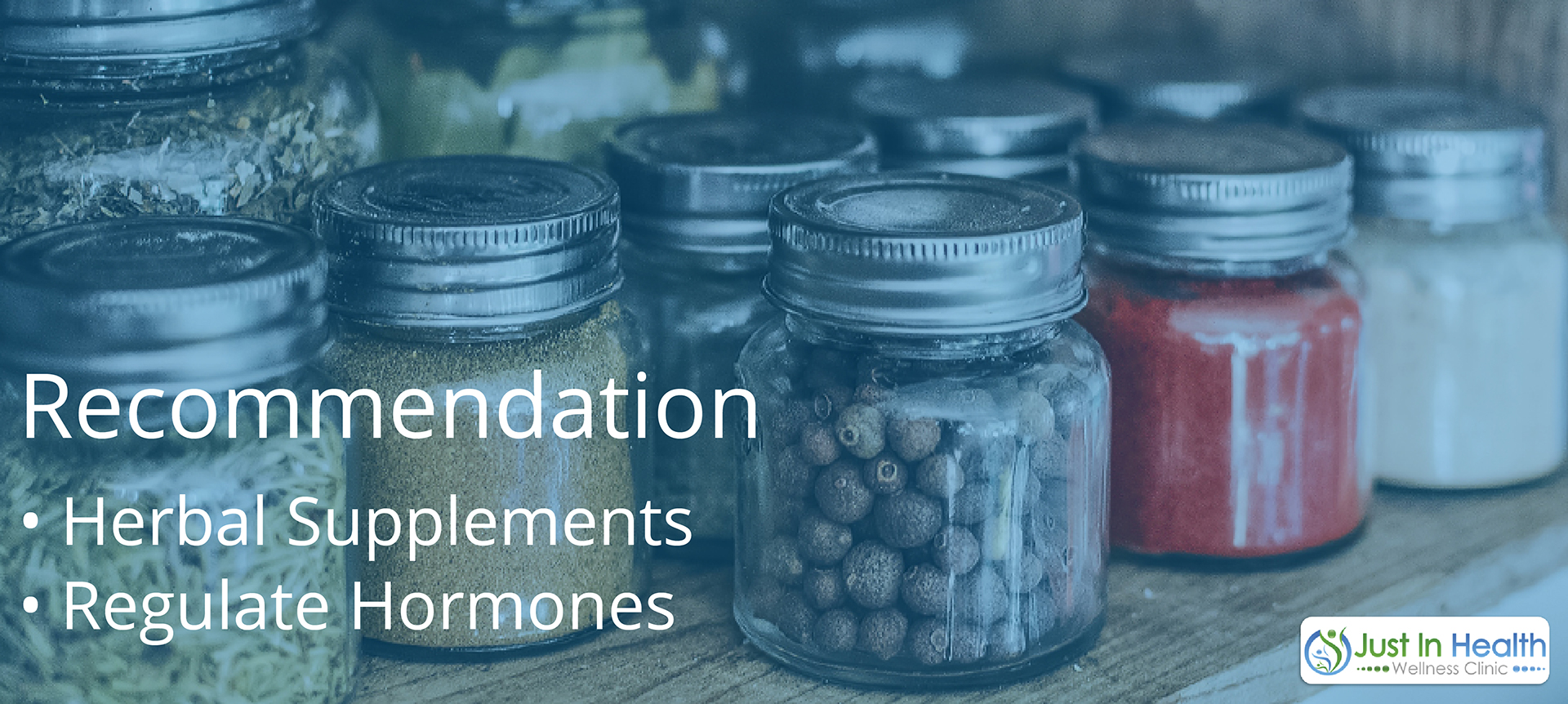

By Dr. Justin Marchegiani
Today’s talk is going to be on brain fog and inflammation. So brain fog is one of the number one signs of inflammation in your brain. Again, there are many different contributing causes to the inflammation which we’ll go over in a second. But if you’re feeling like you’re having a hard time reaching for numbers or names, or speaking smoothly or fluently, or trying to find your keys or just trying to remember facts–brain fog. That’s telling us that there’s inflammation in the brain. And it's really important to know that about half of all cells in the brain are actually immune cells.
50 percent of these brains cells are known as microglial cells, and you can see 50 percent. So that's quite the large amount of cells in the brain that are actually immune-based and when these cells get turned on. they have a real hard time dampening that immune response. So when that cell get turned on, it gets faster and faster and faster and faster creating more neural damage. And we're going to talk some of the ways these cells actually get activated, because we want to do our best to dampen how these cells gets turned on.
Experiencing brain fog? You can get rid of it and you can learn how to do it by clicking HERE.

So first thing is there's a branch of certain food compounds known as excitotoxins and this is kind of controversial. Again, a lot of the research out about excitotoxins are industry sponsors. So there’s obviously a bias regarding we don't want to produce negative studies that are going to take something off the market.
But aspartame, we also have MSG and other compounds. Little known fact: When MSG is below 100 percent, they don't have to call it MSG. They call it something else like autolyzed yeast extract or something else, flavoring or spices. So you can get exposed to a lot MSG and not even know it. But aspartame is still in that same family and it's known as an excitotoxin. And literally what excitotoxins are doing, they are activating these microglial cells. They are exciting and stimulating these microglial cells, and these microglial cells create reactive oxygen–reactive oxygen species, i.e. free radicals that continue to create damage to the brain. And they actually happen to affect the area in the brain known as the hippocampus. And the hippocampus is an area that affects learning and memory. So this is really, really important. We want to do our best to eliminate excitotoxins in our food.
There are couple of articles in the scientific literature by Dr. John Olney. Russell Blaylock also references more on his books regarding the excitotoxic activity of it. Also aspartame if you look at the compound, it’s an amino acid called phenylalanine, also aspartic acid and then we have about 10 percent methyl alcohol. So ethyl alcohol is the one we drink to get a buzz and the methyl alcohol actually is very toxic. So there is 10 percent of that forming in that can add to that excitotoxic activation.
Gluten is one of the biggest stimulators of a leaky gut and we unzip the tight junctions in our gut. We unzip it and food can start going through the bloodstream or through the gastric epithelium into the bloodstream. That can heighten our immune cells and this heightened immune cells basically can affect the astrocytes. The astrocytes you can think of as they line the brain. They’re like the blood brain barrier and they line brain. And when we basically activate those astrocytes, we start allowing gluten and the inflammatory molecules to make its way past the blood brain barrier. This can create more inflammation of the brain. So we have this whole gluten, leaky gut mechanism This mechanism breaks down our blood brain barrier and allows more inflammation in the brain. So we really want to cut out various glutens and also there are infections, too.
Low blood sugar is a big one. So when our blood sugar goes low, a lot of people just associate that with maybe potentially starvation or in the scientific literature. They talk about it with people giving themselves exogenous insulin and that dropping the blood sugar low. The problem is most patients that I see, it’s reactive hypoglycemia.
So imagine they’re blood sugar is low. Let’s say, they eat a bolus of food that takes their blood sugar up high and then our body reacts by pumping out a whole bunch of insulin that drops that blood sugar. So then that blood sugar drops down low, even lower than before. And then what’s the first thing that people always say when you have low blood sugar? “Oh, grab a candy bar, grab a thing or orange juice.”
We are on this vicious rollercoaster of blood sugar up and down. So we go from high to low and then the pancreas just comes and spits out a whole bunch of insulin and that insulin lowers that blood sugar. And again, what's happening at low blood sugar, we’re activating more micro glial cells in the brain. We're creating more reactive oxygen species and that’s affecting the hippocampus of the brain.
Also, when we go low blood sugar, that puts us in the sympathetic nervous system state, so we are also activating our amygdala as well, which is like the Fight or Flight center in our brain stem. So then it actually kills our appetite, too, so then we’re like, “Oh, I really don't feel the need to go have some protein or some fat because my appetite isn’t that good. I’ll reach for the candy car instead.” I think everyone knows that maybe if they got scared or if they’ve gotten a fight and they saw a really violent scene on television, you may say, “Oh, I lost my appetite.” It’s because you’re getting a brain stem response from your amygdala that’s putting you in that Fight or Flight pattern–so low blood sugar.

There’s some research in the scientific literature, things like H. pylori and Lyme disease can actually affect and every time we have inflammation, we’re looking at the leaky gut pathway and that can create the leaky brain and then in some patients, for instance, we’re even able to find H. pylori and Lyme in the brain or in the nervous tissue.
So we always want to make sure you’re infection-free. Everyone has the right to be infection-free. When have prolonged leaky gut–prolonged leaky gut can definitely increase our chance of infections.
This is important because seventy to eighty percent of the solid portion of our brain is fat, so we are what we eat. So we have to eat the raw material so we can build our brain back up. If we’re not eating our essential fat-soluble nutrients, vitamin A, D, E and K, EPA and DHA fats from high-quality fish or cod liver oil, we’re not going to have the raw material to build back our brain. Plus fat is incredibly satiating and it’s going to have an effect on stabilizing our blood sugar. The less our blood sugar goes up and down, the less chance we have at activating our microglial cells. And creating this reactive oxygen species or free radicals and creating more damage in the brain. So diet is really important.
Not to mention, things like magnesium. Magnesium’s an amazing brain antioxidant. And there are over three hundred enzymatic roles in the body and it’s also very important for blood sugar metabolism. So you can see the mechanism with low blood sugar and magnesium in the microglial cells, magnesium is very, very potent at squelching inflammation in the brain.

Other herbs like curcumin is also very potent at bringing inflammation down in the brain. Antioxidants like resveratrol or pycnogenol, these are excellent bioflavonoids that can help dampen the inflammation in the brain. So there’s ginkgo biloba, is another good one.
Again, when it comes to these various herbs, absorption’s important if we have a leaky gut and we have digestive problems. Absorption may not be there, so a liposomal form can be better and making sure the dose and the potency is perfected because if you have low absorption, you may have to go higher just to get a therapeutic response. So I hope this kinda gave you some good information.
Also one more thing I forgot to add in here, we have to talk about hormones. Hormones are really important. When we have high levels of cortisol, prolonged levels of cortisol can actually cause damage to the hippocampus according to Dr. Robert Sapolsky out of Stanford. So hormones are important. High levels of stress. Lots of cortisol being pumped out or cortisol dysregulation, high to low cortisol can create damage to that hippocampal area.
Also in menopause, I see this quite frequently. Menopausal women, they’re primarily making more of their hormones from their adrenals, they tend to have lower estrogen. So decreased levels of estrogen and it's not just estrogen. It’s actually certain kinds of estrogen especially estriol and again, estriol is abbreviated E3 because of the tri in there–estriol. So this is a really potent hormone. Again you want to make sure you’re lab tested for it. I can’t tell you how many menopausal women I've seen where we just take a look at their hormones, we get their adrenals and their estrogen levels modulated back to just a normal level, not taking it at a very high level, just bringing it back to normal. It’s amazing how brain fog clears right up and when we do everything else in conjunction with it, we get results so much faster.
Get rid of inflammation and clear that brain fog by contacting a functional medicine doctor.
So if any of these topics or issues resonate with you and you have a question about this, feel free and reach out to me below the video. And look forward to more videos coming your way very soon.